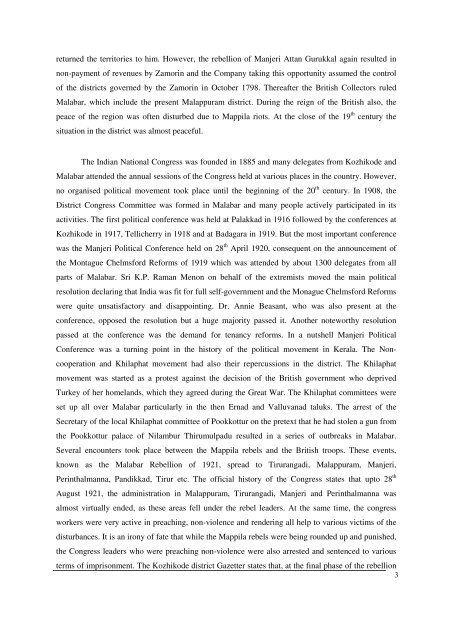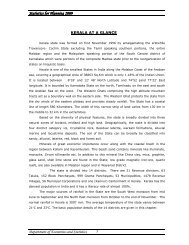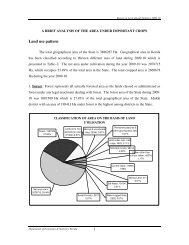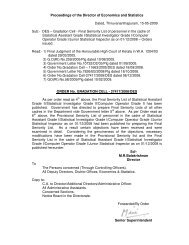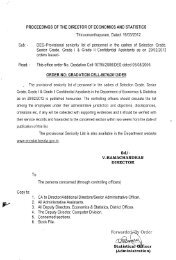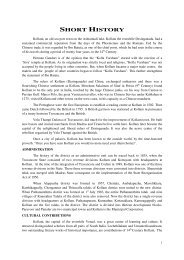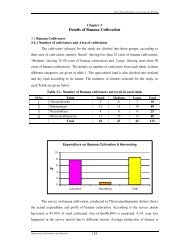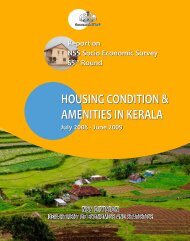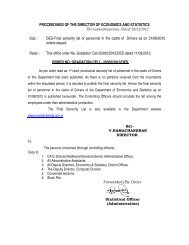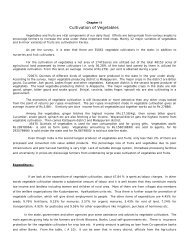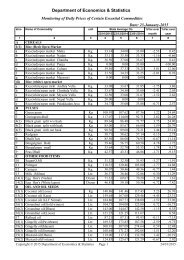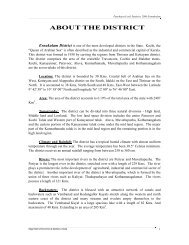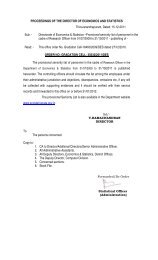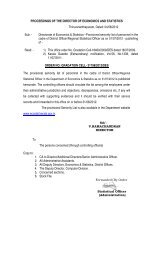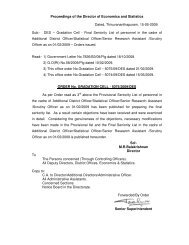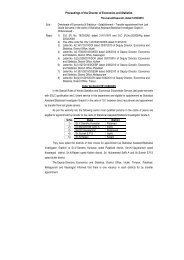BRIEF HISTORY - Government of Kerala
BRIEF HISTORY - Government of Kerala
BRIEF HISTORY - Government of Kerala
You also want an ePaper? Increase the reach of your titles
YUMPU automatically turns print PDFs into web optimized ePapers that Google loves.
eturned the territories to him. However, the rebellion <strong>of</strong> Manjeri Attan Gurukkal again resulted in<br />
non-payment <strong>of</strong> revenues by Zamorin and the Company taking this opportunity assumed the control<br />
<strong>of</strong> the districts governed by the Zamorin in October 1798. Thereafter the British Collectors ruled<br />
Malabar, which include the present Malappuram district. During the reign <strong>of</strong> the British also, the<br />
peace <strong>of</strong> the region was <strong>of</strong>ten disturbed due to Mappila riots. At the close <strong>of</strong> the 19 th century the<br />
situation in the district was almost peaceful.<br />
The Indian National Congress was founded in 1885 and many delegates from Kozhikode and<br />
Malabar attended the annual sessions <strong>of</strong> the Congress held at various places in the country. However,<br />
no organised political movement took place until the beginning <strong>of</strong> the 20 th century. In 1908, the<br />
District Congress Committee was formed in Malabar and many people actively participated in its<br />
activities. The first political conference was held at Palakkad in 1916 followed by the conferences at<br />
Kozhikode in 1917, Tellicherry in 1918 and at Badagara in 1919. But the most important conference<br />
was the Manjeri Political Conference held on 28 th April 1920, consequent on the announcement <strong>of</strong><br />
the Montague Chelmsford Reforms <strong>of</strong> 1919 which was attended by about 1300 delegates from all<br />
parts <strong>of</strong> Malabar. Sri K.P. Raman Menon on behalf <strong>of</strong> the extremists moved the main political<br />
resolution declaring that India was fit for full self-government and the Monague Chelmsford Reforms<br />
were quite unsatisfactory and disappointing. Dr. Annie Beasant, who was also present at the<br />
conference, opposed the resolution but a huge majority passed it. Another noteworthy resolution<br />
passed at the conference was the demand for tenancy reforms. In a nutshell Manjeri Political<br />
Conference was a turning point in the history <strong>of</strong> the political movement in <strong>Kerala</strong>. The Non-<br />
cooperation and Khilaphat movement had also their repercussions in the district. The Khilaphat<br />
movement was started as a protest against the decision <strong>of</strong> the British government who deprived<br />
Turkey <strong>of</strong> her homelands, which they agreed during the Great War. The Khilaphat committees were<br />
set up all over Malabar particularly in the then Ernad and Valluvanad taluks. The arrest <strong>of</strong> the<br />
Secretary <strong>of</strong> the local Khilaphat committee <strong>of</strong> Pookkottur on the pretext that he had stolen a gun from<br />
the Pookkottur palace <strong>of</strong> Nilambur Thirumulpadu resulted in a series <strong>of</strong> outbreaks in Malabar.<br />
Several encounters took place between the Mappila rebels and the British troops. These events,<br />
known as the Malabar Rebellion <strong>of</strong> 1921, spread to Tirurangadi, Malappuram, Manjeri,<br />
Perinthalmanna, Pandikkad, Tirur etc. The <strong>of</strong>ficial history <strong>of</strong> the Congress states that upto 28 th<br />
August 1921, the administration in Malappuram, Tirurangadi, Manjeri and Perinthalmanna was<br />
almost virtually ended, as these areas fell under the rebel leaders. At the same time, the congress<br />
workers were very active in preaching, non-violence and rendering all help to various victims <strong>of</strong> the<br />
disturbances. It is an irony <strong>of</strong> fate that while the Mappila rebels were being rounded up and punished,<br />
the Congress leaders who were preaching non-violence were also arrested and sentenced to various<br />
terms <strong>of</strong> imprisonment. The Kozhikode district Gazetter states that, at the final phase <strong>of</strong> the rebellion<br />
3


